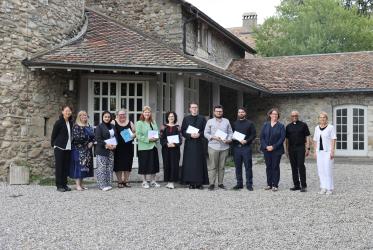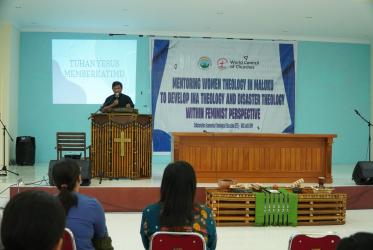Rev. Dr Robina Marie Winbush
Presbyterian Church (U.S.A.)
18-20 November 2007
.pdf version (33 Kb)
Antelias Consultation
1. Responding to an invitation by Konrad Raiser to "explore a new ecumenical configuration which can respond effectively to the challenges which lie ahead in the 21st century" 1 , the World Council of Churches convened a gathering of theologians, church leaders, social scientists, ecumenists and others in Antelias, Lebanon from 17-20 November 2003. This relatively small selected group of persons began a discussion around the changing global and ecclesial landscapes and implications for the ecumenical movement in the 21st century.
2. The Antelias consultation on ecumenical re-configuration was called to:
- analyse the main challenges presented by the changing world situation and their
implications for the configuration of the ecumenical movement;
-
identify the key areas of change and renewal necessary for are-configuration;
-
design a process of consultation and study leading to a report on re
configuration of the ecumenical movement to the Central Committee in 2005 and eventually to the WCC Assembly (2006).2
3. As the participants in this first consultation noted, there were at least three ways to interpret the "reconfiguration of the ecumenical movement." The first was related to the question of broadening of the ecumenical movement. It was noted that the Global Christian Forum was one mechanism that was attempting to address this question. It is an effort to increase the participation of Roman Catholics and Pentecostals in the global ecumenical movement.
4. The second interpretation related to the "deepening the relationships" between churches. It was acknowledged that this is primarily being addressed through bilateral dialogues and other arenas.
5. The third interpretation seemed to capture the most interest. It related to the question of "how relationships can be strengthened between existing ecumenical actors to ensure greater coherence and effectiveness in our work." The issue of greater coherence and effectiveness was directly related to the increase in ecumenical expressions over the past 50 years and the multiplicity of relationships that churches must honor in their ecumenical commitments.
6. The participants identified the following reasons for addressing the
reconfiguration of the ecumenical movement:
-
to ensure that our structures are agile and able to respond rapidly to changes in the world;
-
to develop new methodologies and to renew the confidence of churches to confront the forces of globalisation and hegemony;
-
to strengthen opportunities for all churches, including those who are not active participants in conciliar bodies, to work together more effectively;
-
to ensure that ecumenical structures reflect the realities in the world and the churches, by becoming less Euro-centric and more reflective of the churches in the South;
-
to respond to the frustration of churches who are asked to participate in many ecumenical structures at many levels;
-
to strengthen coherence in our programmes and to avoid duplication in our activities;
-
to respond to the fact that we operate in a marketplace characterized by competition for money, media, delivery of aid, and partners;
-
to affirm the contributions of agencies/specialised ministries as an integral part of the ecumenical family and to recognize that some agencies/specialised ministries yearn for closer cooperation with each other to respond to the pressures of a competitive environment and to be more effective in fulfilling their mandates;
-
to strengthen the base of the ecumenical movement and to reach out to the grassroots;
-
to increase the coherence of our common work, by recognizing our mutual vulnerability and by increasing mutual accountability, self-constraint, and mutual nurturing of each other. 3
7. It was agreed that a broader process of consultation was needed to include the formal voices of churches, ecumenical partners (and potential partners) to respond to the question of "reconfiguring the ecumenical movement." The World Council of Churches initiated a process of inviting churches, individuals, and ecumenical partners to respond to the issues identified in the Antelias consultation. An analysis of current ecumenical structures and relationships was completed.
Chavannes-de-Bogis Consultation
8. A second and broader consultation was held 30 November - 3 December 2004 in Chavannes-de-Bogis, Switzerland. This gathering brought together representatives from churches, agencies/specialized ministries, regional and national council of churches, Christian World Communions, and international ecumenical organizations. Included in representatives from the churches were Roman Catholic and Pentecostal leaders. In addition to being a significantly larger gathering, participants were clearly representing their entities and brought the wisdom of dialogue within their organizations to the consultation. In addition to the analysis of the changing geo-political and ecclesial realities, there was very helping presentation on the "mapping ofthe ecumenical movement" which highlighted the multiplicity of ecumenical relationships and the absence of coordination and coherence between the organizations.
9. A significant change in the second consultation is seen in the name of the consultation. The Antelias consultation gathered around the name "Reconfiguration of the Ecumenical Movement." The Chavannes-de-Bogis consultation gathered under the name "Envisioning Ecumenism in the 2151 Century." The shift in name suggested a shift in focus from a reconfiguration of what is to an opening to what may become. It also indicated a movement from "survival" of existing institutions to a more process-oriented exploration of new possibilities. The Chavannes-de-Bogis consultation also brought significant participation and ownership in the process of agencies/specialized ministries and other ecumenical organizations. A major issue both directly on the table and underneath the discussion, was the proposal for a new table to bring together agencies and churches working in the area of development. 4
10. The Chavannes-de-Bogis consultation offered the following vision for any discussion on structures and organizations:
The Ecumenical Movement in the 2151 century will be a special space:
-
where more and more Christians are involved in the work of Christian unity, and the fellowship among the churches is strengthened;
-
where open and ecumenically-minded culture is fostered in the everyday lives of people in their own contexts and where ecumenical formation is a central focus at all levels of church life, from the local to the global;
-
where spirituality is the basis of life of Christians together and where as individuals, churches and organizations, Christians can pray together and can encourage each other to discern God's will for their lives;
-
where, all, including the marginalized and excluded, are welcomed into inclusive and loving communities;
-
where relationships, built on mutual trust, are strengthened between all parts of the ecumenical family;
-
where each Christian can be supported in practising responsible stewardship and where churches and Christian organizations can be mutually accountable to each other;
-
where diversity of cultures and traditions is recognized as a source of creativity;
-
where hospitality is manifest towards those of different faiths and where dialogue is encouraged;
-
where young people are encouraged to join in and to lead . where women's visions of being church are shared;
-
where the ministry of healing is carried out in shared actions;
-
where the healing of memories leads to reconciliation;
-
where, together, we are able to be prophetic in confronting the injustices and violence of the world and to take risks in our commitment to justice and peace when Christ calls us to do so. 5
11. Several recommendations directed toward the different constituent partners came out of the Chavannes-de-Bogis consultation. However, there was a strong affirmation for the need for renewal and refreshing of the ecumenical movement in a way that facilitates a greater sense of collaboration.
12. The Ninth Assembly of the WCC affirmed the process for continuing the discussion on "Ecumenism in the 2151 Century, both encouraging member churches to engage the process and the appointment of the continuation committee with requested reports to the Central Committee.
Personal Reflections
13. As an ecumenical officer of a church that has both sought to be faithful in its ecumenical commitments in an era of growing and at times competing expectations, this discussion is a welcomed and timely dialogue for our church. We are appreciative of the WCC's invitational role in supporting the gathering of ecumenical partners and exploring together the shape of our future.
14. Of particular note is the vision/value statement that was developed in Chavannes-de-Bogis. It articulates clearly the values that have emerged in our ongoing ecumenical relationships and opens the door for us to live into new values.
15. While this process pays particular attention to the question of facilitating greater coherence amongst ecumenical partners, the issues of broadening and deepening the ecumenical movement must not be forgotten. The Global Christian Forum, which was recently held in Nairobi, was an historical gathering. The values and vision of the Chavannes-de-Bogis must find a place in those discussions and the energy and passion of GCF must infuse the Ecumenism in the 21st Century process. In addition, the challenges and changes in several of the Christian World Communions must inform the Ecumenism in the 21st Century process as well.
16. There is still a need for further tracking (mapping) of the programmatic work (and financial resources that support this work). As noted in the Chavannes-de-Bogis recommendation, this will serve as a tool to avoid duplication and foster greater cooperation
17. I remain prayerfully optimistic that the work of the Continuation Committee will facilitate a process that enables us to both envision an ecumenism for the 21st century and live with one another in new and transformative ways.
------------------------
Footnotes
1 General Secretary report to the Central Committee in August 2002.
2 "From Antelias with Love" Report of Consultation on the Reconfiguration of the Ecumenical Movement November 2003
3 Ibid
4 This issue was later "resolved" with the establishment of "ACT-Development" in 2006.
5 Final Statement from the Consultation Ecumenism in the 21st Century December 2004





